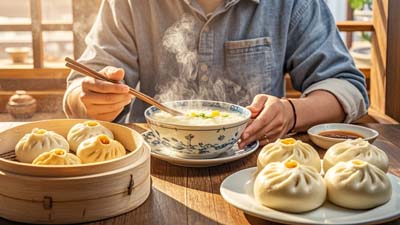Before we introduced one of China’s delicious breakfast duos, 豆浆油条(dòujiāng yóutiáo) or soy milk and fried dough sticks.
A breakfast meal for the hearty looking to be filled with a full, warm meal. Yet there is another breakfast option for those who enjoy eating a lighter, healthier breakfast. If this sounds better to you, then traditional steamed buns and porridge is the food for you!

The porridge in China or 稀饭(xīfàn), is a simple and healthy option that helps with digestion.
The most basic recipe is very easy to make and is called “白米稀饭(báimǐ xīfàn) ” or “rice porridge.” First you wash the rice until it’s clean, then add water to the rice.
The amount of rice should be one/tenth the amount of water. Bring the mix to a boil, then on low heat slowly cook the rice for 40-60 minutes. When its done cooking you can enjoy this light, traditional Chinese breakfast!

Recently, in mainland China this word “稀饭(xīfàn)” has became an Internet slang and can be seen all over the internet.
Yet, on the Internet this breakfast word has a different meaning. Internet users have taken this sweet sounding word to represent the same meaning as “喜欢(xǐhuān)” or “to like,” since “稀饭(xīfàn)” and “喜欢(xǐhuān)” sound very similar.
In the same reasoning, “超稀饭(chāo xīfàn)” has the same meaning as “超喜欢(chāo xǐhuān)” which is the same as “love it very much!” in English.
Wǒ nǎinai zǎoshang xǐhuān chī xīfàn, róngyì xiāohuà.
我奶奶早上喜欢吃稀饭,容易消化。
My grandmother likes to eat porridge in the morning, its easy to digest.
Jīntiān zǎoshang wǒmen chīle jīdàn, xīfàn hé bāozi.
今天早上我们吃了鸡蛋、稀饭和包子。
Today we ate eggs, porridge and steamed buns for breakfast.
Don’t forget if you are having porridge for breakfast, it is best paired with stuffed steamed buns or “包子(bāozi)!” These tasty buns are made of a flour and water mixture that is stuffed full of delicious foods and then steamed to perfection.
Usually they are filled with different kinds of meat and vegetables, as well as sesame seeds or sweetened bean paste. In different regions in China you might come across different versions of this delicious breakfast.
For example, China’s Tianjin has the “狗不理包子(gǒu bùlǐ bāozi)” or “Even the dog ignores steamed buns.” These famous steamed buns, with their unique and funny name, are known all over China.
The word “包子(bāozi)” like “稀饭(xīfàn)” has another use, but one that refers to people. It is used to describe a person that has a weak personality.
So weak that when they are facing other people’s excessive behavior, they not only don’t get angered or resist, but instead swallow the insult and blindly yield, sacrificing their own self-interest.
Chén Lín: Mǎ Kè, nǐ zǎocān xiǎng chī shénme ya?
陈 琳:马克,你早餐想吃什么呀?
Chen Lin: Mark, what would you like for breakfast?
Mǎ Kè: Tiāntiān chī bāozi, jīntiān chī wǎn miàn ba.
马 克:天天吃包子,今天吃碗面吧。
Mark: I had Steamed Buns every day, I want to have a bowl of noddle today.
Tā jiùshì zhèzhǒng bāozi xìnggé, búhuì fǎnkàng.
他就是这种包子性格,不会反抗。
He has the “stuffed steamed bun” temperament, he can’t rebel.

1. As a buzzword, what does “稀饭(xīfàn)” mean?
A. Watery porridge
B. To like
C. Breakfast soup
D. Answers A and C
2. What are “包子(bāozǐ)” usually stuffed with?
A. Different kinds of meat
B. Red bean paste
C. Vegetables
D. All of the above
3. What does it mean if someone has a “包子(bāozǐ)” temperament?
A. He likes to eat “包子(bāozǐ).”
B. He is softhearted and easy to get along with.
C. He has a weak personality and gives in easily.
D. He loves to eat food and is fat.
Chinese Popular Words (Fun Stuff)
General Chinese (Beginner Level)
General Chinese (Intermediate Level)



